By Emma Moore
The door to the butcher shop swings open, and a man walking down the street peaks his head inside, calling out a greeting. The owner of the store, Ken MacDonald looks up from where he is preparing chicken breasts. The white-haired butcher with a salt and pepper beard is dressed in a black apron and long sleeve black shirt, and he sets his knife down on the cutting board to wave at the man. People who live in the Yonge Lawrence village know MacDonald and trust his store, says the butcher.
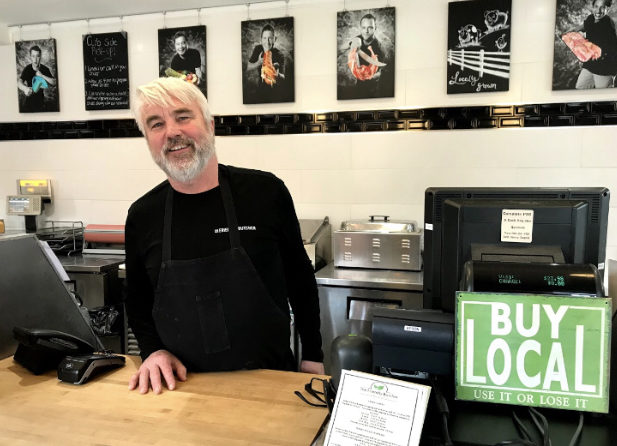
Folks who enter are greeted by whomever is working the counter that day, exchanging smiles and pleasantries. MacDonald, even after 24 years of operation, still works the counter and helps prepare the food. He is in the shop most days. If someone calls in sick, or something goes wrong, MacDonald is always ready to come back and make sure things are running smoothly once more.
The Friendly Butcher acts as both a butcher shop and a grocery store. It also offers a variety of prepared foods, such as potato latkes, chicken wings, homemade soups and meat pies. In the spring and summer months, the lunch rush brings in members of the community looking for a bite to eat, and the patio is the spot to be. From the patio, customers can watch people walking their dogs and get a good view of the hustle and bustle of Yonge Street, says customer Devin Vernon. The 25-year-old began shopping there when his friend’s mom recommended it, and he often likes to drop by to grab a burger or two with his friend.
When the sun ceases to hide and the weather is warm, MacDonald and his staff host barbecuing classes out on the large grill in the outdoor patio space. These classes are rooted in the needs of the community, MacDonald says. When he first opened the shop, he recalls volunteering on Wednesday evenings at a mothers group hosted by the local church. He would bring a pot of soup, doling it out into bowls for the new mothers to taste, and was peppered with questions about cooking.
“I never wrote anything down… they just kept asking questions and then… they would say ‘oh I wish my husband was a better barbequer’ or ‘I wish I was a better barbequer’… So then (The Friendly Butcher) started doing barbecue classes.”
Ken and Donna MacDonald opened their doors in 1996 and their business has been growing ever since. Their longevity is a success— according to the Government of Canada statistics in 2019 , only 31.3 per cent of businesses in the services-producing sector were still around beyond 15 years of opening. Now, 24 years since The Friendly Butcher opened, the business is still going strong, and they have opened a second location in York.
Soft music plays in the shop, mingling with the conversations between the staff and customers. Labels detailing the contents of the wooden shelves are decorated with a brushstroke font describing the assortment of pastas, sauces, and snacks. A variety of woven baskets bearing fresh fruit and vegetables are housed at the back of the shop; all of which contribute to the grocery component of the store. A cow statue with paint chipping off is parked at the back of the store, well-worn over time as children who come into the shop tend to climb aboard it like a toy.
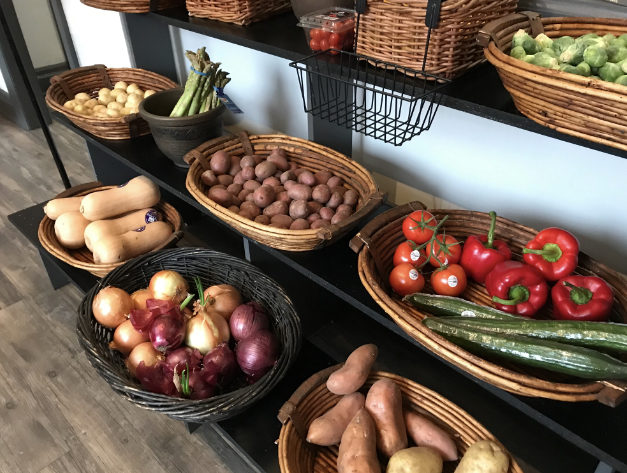
The fresh fruits and vegetables are stocked and prepared to sell daily in woven baskets at the shop on Tuesday, March 3, 2020 (Emma Moore/T•). 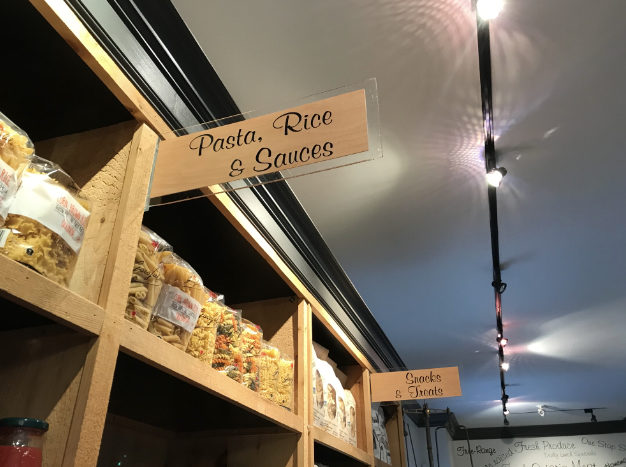
A shot of the wooden shelves that display a variety of grocery items sold at the butcher shop on Tuesday, March 3, 2020. They began carrying grocery items beyond meat at the request of customers (Emma Moore/T•). 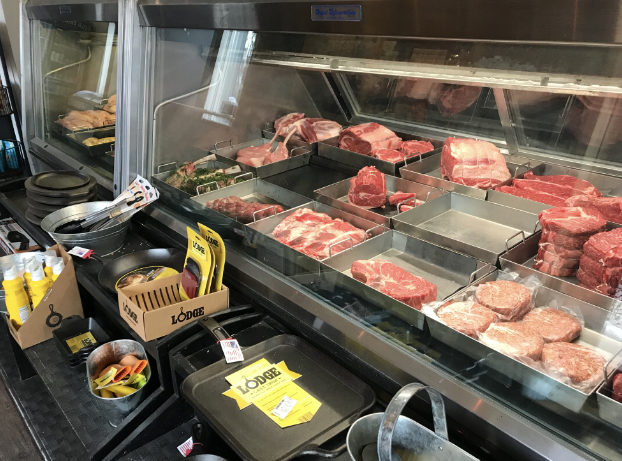
The display cases by the front counter of The Friendly Butcher from the perspective of a customer on Wednesday, Feb. 19, 2020 (Emma Moore/T•).
In a display case beneath the front counter, an assortment of collectible toy cars resides, bright and eye catching. Children wander up to the front counter when they come into the shop, and gaze at them, MacDonald says. He collected the cars for years, originally keeping them at home. He decided to bring them into the store, adding a piece of his home into the butcher shop. The butcher shop is a hub for families, and MacDonald has seen many children in the community grow up.
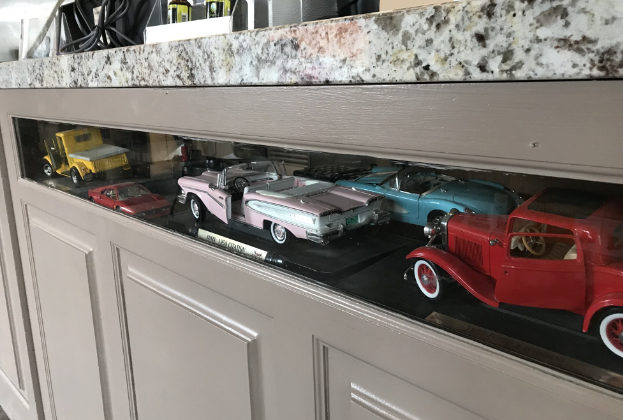
An arrangement of toy cars and trucks that MacDonald has collected over the years in a display case underneath the cash register on Wednesday, Feb. 19, 2020 (Emma Moore/T•). 
A closeup shot of a pink collectible toy car in the display case beneath the counter at The Friendly Butcher on Tuesday, March 3, 2020 (Emma Moore/T•).
“We make sure we have hot dogs; we do little sliders and stuff. (The kids are the) next generation clientele. You know, even when they get older… (as) teenagers, they come here and get chicken wings and stuff for their friends at home… That’s part of growing a business is (continuing to) grow your business with a new clientele.”
Sometimes, the parents of local children will send their kids with a list of groceries to do the shopping at the butcher shop by themselves. MacDonald says that this trust for the butcher is what makes the community shop special.
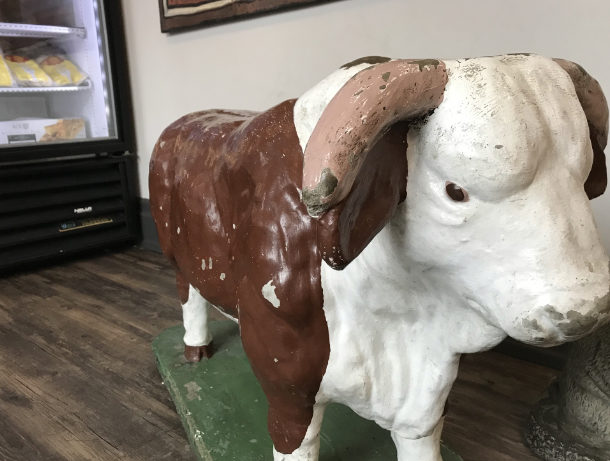
Growing up, MacDonald worked on a farm, and this experience led him to value the efforts that go into ethically raising the animals and ensuring the best possible product. MacDonald has known he wanted to open his own butcher shop ever since high school, when he participated in a co-op program at another butcher shop. Now that he owns his own butcher shop, he makes sure to hire local high school students.
“It’s a great way to get something on their resume, so (when) they go away to university (they have) some job skills… It’s important when you support the local economy,” says MacDonald.
The butcher shop goes beyond just supporting local high school students with jobs. They also source all of their meat products from local farms. When he searched for farms to purchase meat products from, MacDonald visited farms and made sure that the animals were being raised properly. Once finding the farms that treated their livestock well, the butcher shop built a relationship with those farms, still sourcing from them today. Vernon says that knowing that the food is ethically and locally sourced makes him feel good about spending his money there.
“I would prefer to eat there than I would a chain restaurant just because I know it’s local, and I’d rather give my money to smaller businesses.”
According to MacDonald, a ripple effect occurs when people choose small local businesses, as it creates jobs for youth in the community, and allows him to support local farmers.
“If you shop locally, your neighbourhood is going to become more vibrant.”
